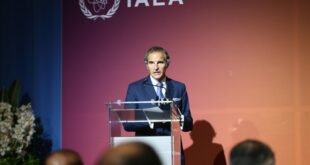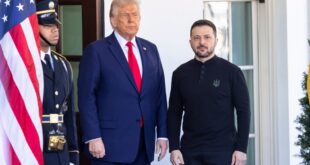While Syria’s ceasefire is slowly unfolding as expected, it is fair to say that the general fight against ISIL, which has two parallel tracks: military and political, is facing serious obstacle on both tracks at present. Yet, we do not see those obstacles as signs of regress. They look more like signs of progress, albeit in a very slow pace.
On the Syrian political track, and despite the large violations of the ceasefire by almost all parties March 7 and 8, the prospects of an intermediate phase of relative quiet are coming out of the fog. In Iraq, the US seems to see the problem of ISIL correctly-that is to see that first and above all, it is a political problem.
Militarily, however, we hear now US military officials explain that defeating ISIL in Mosul, Raqqa and elsewhere in Iraq and Syria will require putting more US boots on the ground there. In his testimony before the Senate Armed Services Committee Tuesday March 8, General Lloyd Austin, commander of U.S. Central Command, pointed to the need for “additional capability” to retake Mosul, as well as ISIL “capital” Al Raqqa in Syria. “We could increase some elements of the Special Operations footprint”, he said.
The future Commander of CENTCOM (effective this month), and current Commander of US Special Operations Command, General Joseph Votel, said there is no current plans to capture Raqqa.
Aside from reluctance in Washington to send more troops to Iraq, the “strategy” of training and equipping indigenous forces to fight ISIL should obviously consider the ethnic and sectarian realities of the landscape. General Austin said he has asked for “permission” to restart a program to train and equip indigenous forces to go after ISIS “using a different approach” from the previous program that ended in failure.
Austin explained that the different approach would focus this time on a smaller set of people to train others who would then “enable” larger groups allied with the U.S. and its allies inside Syria. As we will see shortly, the US is simultaneously pushing hard for a political deal in Baghdad, while trying hard to keep Syria’s ceasefire in place until talks start and gain some momentum on their own.
The political problems in both country differ only in appearance and details. They both are reflections of the same problem: alienation of segments of the populations on sectarian or ethnic bases and the sheer political oppression. But details count. While in Syria we see serious prospects for a de facto partition, at least for some time, in Iraq, however, the country is already and silently partitioned.
If a partition of a country would not bring stability or end terrorism, then why should it be considered? And if partition will cause a new fight to “regain the national unity”, it would be an exercise in futility.
The expedient “solution” of partitioning Iraq and Syria should be historically understood as a short process towards a different unity. Otherwise, the “old glorious past” of the imagined “united and independent national unity” will replace the illusions of the “old glorious past” empires that we hear of in fundamentalists’ literature and which are gone long ago.
Partitioning would go in the collective conscious in the region as a result of an “external conspiracies of the major powers”. Yet, preserving the “unity”, as Mr. Vladimir Putin understands it, that is to say by sheer oppression, is in fact an artificial preservation of the whole through a “cut and paste” technique. Furthermore, it is wrong to assume that both countries have zero national identity. There was a process going on, albeit extremely slow, to forge such a collective identity. A Syrian or an Iraqi identify themselves as such before talking about their ethnic or sectarian differences. But a fully formed national identity, capable of suppressing ethnic or sectarian affiliations if they oppose the national bond, was not there yet.
Historically, this intermediate process, summoned in what we currently see in both Syria and Iraq, should be a step towards a different unity. But what does this mean in terms of the immediate threat: ISIL?
The question reveals the interlink between both the political and the military tracks. And obviously, strategists and officials in the US understand that clearly.
In Baghdad, for example, and during the first week of this month, US Special Presidential Envoy for the Global Coalition to Counter ISIL Bret McGurk held three separate meetings with senior Iraqi officials. It was noticeable that Vice President Jo Biden, who was in the nearby UAE, avoided visiting the Iraqi capital, though he is the ultimate US authority in Iraqi issues. Instead, McGurk had to fly to Abu Dhabi March 6 to brief the VP. Biden only called Iraq’s PM Haider Abadi to reiterate what McGurk already said to the PM.
And according to stories told by Iraqi officials, McGurk expressed discontent at the pace of political reform and the fight against corruption. He explained that while the US understands the urgent financial needs of the Iraqi government, which is almost running out of cash, it cannot help much so long as corruption remains at its current levels. The US official waved before the Iraqi PM eyes a loan of $10 billion only “if there is enough progress” in both reforms and sufficient anti-corruption measures.
In the past, Biden needed no invitation to visit Iraq. He was there often. Now, this is his third visit to the region which skips Baghdad from its itinerary.
If that was indeed what McGurk said in Baghdad, this would be the right policy. Defeating ISIL, while preserving all the conditions that led to its emergence in the first place, does not mean much.
The current tension in the bi-polar tissue of the present day Iraq testifies to the nature of the transitional period we currently see in there. There are forces pulling Iraq, maybe unintentionally, towards partitioning the country, even within the Putin “envelope” of preserving the artificial whole through an iron fest policy. On the other hand, there are forces that understand that Putin’s policy, which is identical to Iran’s (as shown during the two terms of Nouri Al Maliki), would lead to another ISIL.
This was clear in a meeting which gathered all Iraqi Shia leaders in Karbala March 6. The meeting was held to reach an agreement on how to deal with popular protests, reforms and corruption. Muqtada Al Sadr and Amar Al Hakim expressed views that tend towards moving the country forward in the path of reform. However, Sadr stormed out of the meeting and Hakim left earlier. Sadr later said that the communique issued after the meeting was not approved by any of the two. “I left this meeting early with enormous pain in my heart and deep concern over the unknown future of our country”.
Sadr and Hakim have some of civil society protests’ support. Sadr is said to be preparing for a popular march to the Green Zone in Baghdad.
Signs of the bi-polar nature of the transition are multiple as shown in the popular protests and the differences with the Shia political block. However, the political establishment, or precisely said, the pro-Iran political forces in Baghdad, are putting substantial resistance. They are firm believers in the Putin’s concept of a forced “national unity”.
It is indeed an extended cross road for Iraq. Abadi is too weak a politician to become a “national leader” and implement the needed reforms without hesitation. He has the support of the Iraqi “street”, yet he is unable to translate that into bold steps to fight institutionalized corruption and sectarianism.
Iraq is waiting for the formation of a new government which, hopefully, would be based on proper inclusive political representation. It is waiting for the implementation of sweeping political legislations which address the sectarian and national fragmentation of the country (The return of the displaced and the general amnesty in particular) and settling the differences about the National Guard and the oil revenues proposed laws. It was indeed the proper time for McGurk to make things clear.
However, on the military front, the battle for Mosul is suspended for some time on the hope that Baghdad will pull itself, and the country, from the current crisis and take the road towards reform. If wishes have wings, the best way to go is to gather all of Iraq’s population and capacities behind the forces that will free Mosul. Yet, this front has some additional clouds.
The PKK, sensing that the US needs its role, is showing signs of defiance. A spokesman for the party said March 8 that Iraqi Security Forces and the Kurdish region’s Peshmerga “Cannot liberate Mosul on their own without our help”. The spokesman of the Kurdish group explained that the sectarian and ethnic nature of the forces which are supposed to liberate Mosul do not enable them to accomplish the mission. “Without us, the liberation of Mosul would be impossible. The Turks better avoid any participation in the fight if Mosul is to regain some stability once ISIL is defeated. We have 4000 fighters standing by to participate”, he said. It is indeed a strange statement coming from a fully Kurdish force.
A spokesman for the KRG responded by asserting that it would only be the Coalition, Iraqi Security and the Peshmerga that will fight for Mosul. “No one else is allowed to participate”, he said.
This shows that “the political track” is not merely a domestic Iraqi issue. It is also Iranian and Turkish in many ways. Mosul would certainly turn into a battle field between the Turks, the Kurds and Iraqi Security forces backed by the pro-Iran Shia militias. Once on a regional level, Mosul transcends the ISIL issue.
In Syria, we see the same interlink between the political and the military anti-ISIL efforts. And again, if wishes have wings, we hope to see a solution to pull Syria out of the Putin’s concept of national “unity” to the broader horizons of people determining for themselves the kind of government and country they call theirs, then collectively fighting ISIL and all other forms of organized terrorism.
However, what we see on the ground is yet another manifestation of the overall regional transitional phase and the same kinds of bi-polar forces, albeit in different forms, fighting to take the process either on Putin’s road or on the only proper way: The voluntary collective participation in building a nation based on the equality and liberty of its citizens.
While Syria’s ceasefire is starting to collapse in some fronts, in one small town, Al Dameer, south of Damascus, and the same way their Iraqi brethren did, the population gathered in a large rally and demanded that all opposition group “complete their exchange of prisoners by noon March 11, get all non-Syrian fighters out of town, return private properties they confiscated and end all signs of armed presence by the same time”. The town may witness clashes between the two sides in the coming weeks.
Demonstrations swept Syria during the few days of quiet calling for the fall of Assad and singing for freedom. Last year, and up to now, Iraq witnesses the awakening of its civil society as well. Yet, it is not in the hands of the people of either Iraq or Syria to even determine what kind of country they would have until they appropriate this role by themselves. This is their road to building true nations and defending the equality of their citizens.
The objectives of the transitional phase is to prepare for the fight to defeat ISIL, force Putin’s concept of national unity into retreat, get rid of Assad who kills his people as a hobby, convince Tehran to respect the peoples of its neighbors and defeat those backward apocalyptic so-called “Islamists”. And this certainly is not a stone throw away.
 Geostrategic Media Political Commentary, Analysis, Security, Defense
Geostrategic Media Political Commentary, Analysis, Security, Defense





